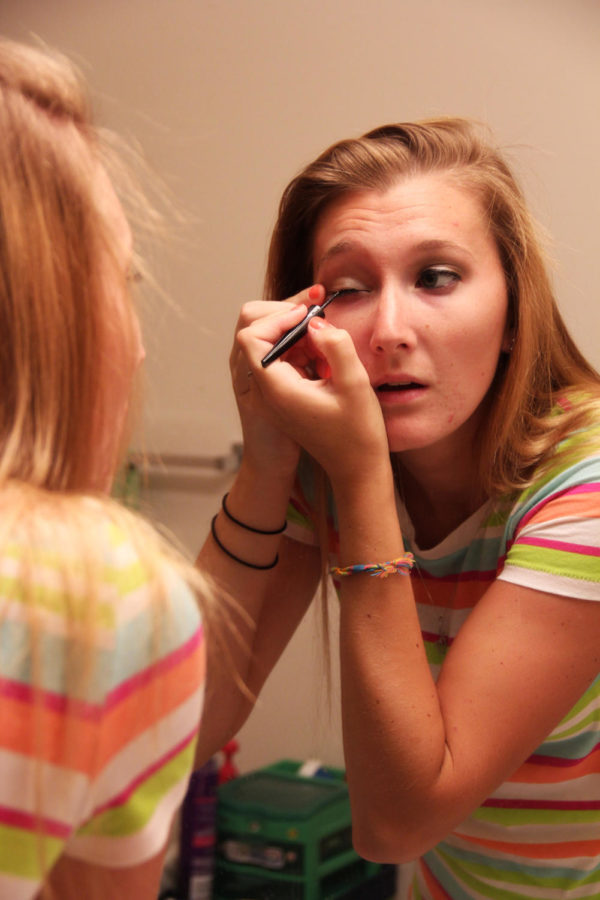Yetley: Makeup works as unnecessary tool for validation
Photo: Kelby Wingert/Iowa State Daily
Katey Molka, junior in child, adult and family services, applies her makeup before classes on Aug. 28, in her apartment. Columnist Claire Yetley writes beauty practices across the ages dictate cultural ideals and standards for women. Makeup is a tool that can be used to define femininity.
August 29, 2013
As far back in history as ancient Egypt, men and women wore a substance similar to eyeliner called kohl. It might have been the start of makeup as we know it, and it certainly wasn’t the end.
Women in the renaissance era would apply white powder that often contained arsenic to their faces to look as if they have never spent a day outside. The sun-tanned look that is coveted by some in our culture today was actually a symbol of low social class. French women were the first to pull off bright reds on their lips and cheeks. This was so extreme and dramatic at the time that other cultures questioned the French’s makeup culture.
Cosmetic surgery has a history that dates back to ancient India in 800 BC., where they performed skin grafts. But in fact modern day plastic surgery started to develop during World War I when soldiers would return home with serious and deformative wounds on their face.
As our society’s demand for physical labor decreases the purpose of gyms is less about sports and recreation than it is about personal fitness. Yes, it is healthy to work out but there is such a thing as excessive exercise. Being toned and muscular is actually becoming more and more unnecessary for most lifestyles where people work at a desk, drive a car, and are not required to do any amount of heavy lifting unless they want to.
But people still work out at gyms nonetheless. If a limb is blown off or a face disfigured in battle, soldiers will do what they can to attain normality. Women still wear blush and mascara even though today people recognize it as makeup instead of a natural face.
Why is our culture so obsessed with appearance, and more specifically, why are women drawn back to makeup day after day?
There is the common argument that it’s enjoyable to put on makeup. That makeup is an opportunity to express one’s self and be creative. The face a woman chooses to show reflects her personality in some ways. But this all begs the question: To whom are they being expressive?
Psychologist Lauren Suval said: “Whether we choose to acknowledge it or not, the desire for validation is one of the strongest motivating forces known to man.”
Whether women say they wear makeup for themselves or to look beautiful, the ultimate reason is because humans seek approval, and makeup validates their identity as feminine in our society. The raw truth is that we as a society wish to look attractive to others.
As a result of this cultural trend, the cosmetics industry jumped from $300,000 in sales in 1927 to $3.2 million in 1930, correlation: the silver screen.
Jean Harlow was considered one of the first movie “stars” in America, with platinum blond curls, red lips, and signature giggle-like trait she did in movies. With her and other actresses’ prominence, women began to compare themselves to these female models of beauty and grace instead of their fellow, ordinary women.
The evolution of makeup has been closely tied to the evolution of media. More movies are produced, and billboards pop up on highways. Women and men see beautifully made-up actresses on the screen and wish to look just like that. The television moves the media inside the home, making it accessible every day. The advertising industry booms, filling every print media with glossy pictures. It is no longer just movie stars but also commercial girls that attach their beauty to products.
Appearance has always been important to men and women, and the careful application of makeup each morning is not a new trend. However, as technology and the media expand and grow, there are more outlets through which women compare themselves to others. The critical nature of the media causes women, in turn, to be critical of themselves.
Because makeup has been in our human culture since ancient Egyptian times it is now accepted in most places around the world. But the drive for validation and acceptance only grows with each generation of women. Makeup, so essential to some women’s lives, becomes more and more of a tool with which women shape themselves to a cultural “ideal.”

















